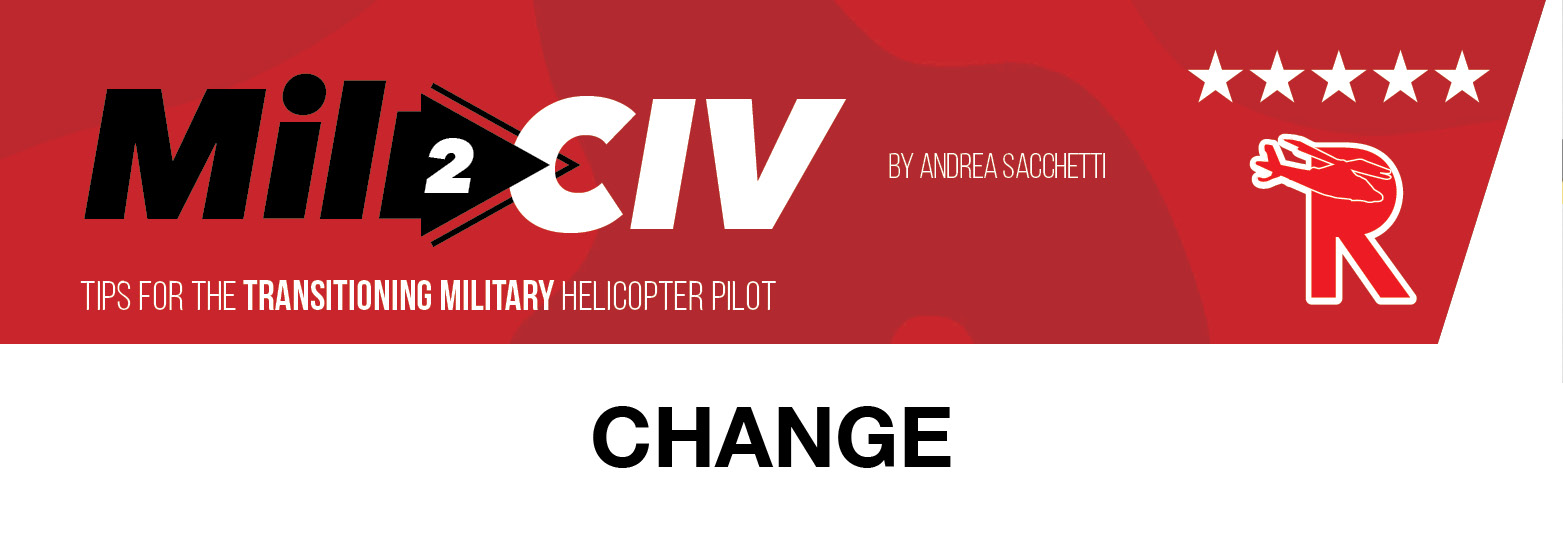|
Apr
11
2022
|
|
Posted 3 years 325 days ago ago by Admin
|
|

Transitioning from the military can be daunting to say the least. If you’re still active duty and considering your transition, whether after 5 years or 25 years, you probably have a lot of questions swirling around in your head. I made the leap about 6 years ago, but my process started about 5 years prior to that. I hope that some of my experiences and observations can help you as you consider your future beyond the uniform.
I had no doubt I would leave the Coast Guard right at the 20 year mark and started preparing accordingly. I did the easy stuff first: Converted my logbook in accordance with FAA regulations, scheduled and earned my ATP certificate, used my GI Bill to get a multi-engine fixed-wing rating, and updated my LinkedIn profile to include a professional photograph. I started attending the Heli-Expo annually in order to network, meet people and learn more about different careers within the helicopter industry. This last part was crucial to my success, learning about what was out there helped me narrow down a few industries within which I wanted to work.
One thing that helped keep me on track was coming up with a checklist, goals, and timelines. I was still active duty at a pretty busy job, but made sure I did at least one thing each week that was solely to help with my transition. I was also fortunate that my supervisor was understanding and provided me with space in which to do these things (such as taking time off to go to Heli-Expo). I would suggest being open and honest about your goals, setting expectations with your current supervisor and coworkers to ensure they know that while you are still dedicated to your current job, it is vitally important for you to prepare for your (and maybe your family’s) future.
The hard part about any military member’s transition is the change. That is the key word—change. Every aspect of your life will change. And not just your life, your family’s life too. The most successful people I’ve seen navigate their transition were people who not only accepted this change, but embraced it with their families.
You will face possible changes in your location, uncertainty in your finances, healthcare coverage, work schedules, people and coworkers, even changes to your wardrobe. Your partner may be looking for a new job, your kids looking at yet another new school. And all of this is driven by your own choices—not by an assignment officer—and that can be overwhelming. While you’re busy with your checklist and preparations, don’t forget to also check in with your partner and kids to see how they’re managing with the upcoming change.
Here are a few important questions to discuss with your family. These will help you search for work that best fit your needs and preferences:
Where do you want to be? Is being near family important? Or is stabilizing the kids’ school life a bigger factor? Is commuting long-distance an option in order to live in your preferred location?
How much money do you need to make? This is potentially different from what you want to make. Be sure to take taxes into consideration; you will no longer be protected from state income tax (if applicable) and all your income will now be taxable. Be especially sure to make some calculations if you start a job while still on terminal leave at retirement.
What kind of lifestyle do you want? Do you want a stable schedule, or can you tolerate uncertainty that often comes in the aviation industry?
Finally, don’t forget the fun stuff! If you promised the family a big trip to Disney World when you retire, make sure to schedule it. Did your partner want to go to Europe for a month? Now is the time. Don’t put it off, because once you do start a new job you won’t have that 30 days of leave every year. With a little effort, you can not only succeed in your transition, but enjoy the process.
About the author: Andrea Sacchetti retired from the U.S. Coast Guard in 2016 after 20 years, and is now a base lead pilot for REACH Air Medical Services flying the EC135. She regularly mentors transitioning military pilots and has been a speaker at a military-to-civilian transition seminar.
READ MORE ROTORCRAFT PRO
WATCH ROTORCRAFT PRO YOUTUBE CHANNEL
You can also find us on
Instagram - https://www.instagram.com/rotorcraftpro/
Facebook - https://www.facebook.com/rotorcraftpro/
Twitter - https://twitter.com/justhelicopters